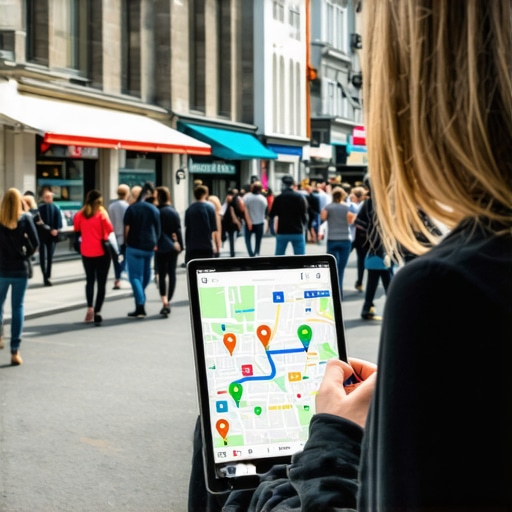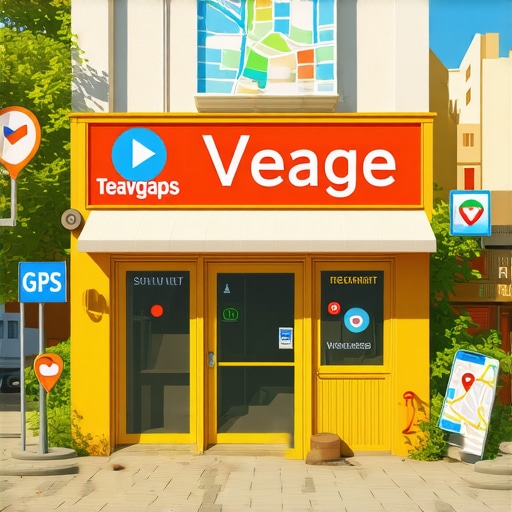Unveiling the Secrets to Local Search Supremacy in 2024
Ever wondered why some businesses skyrocket to the top of local search results while others linger in obscurity? As a seasoned columnist who’s seen the digital marketing landscape evolve faster than a cat chasing a laser pointer, I can tell you this: mastering Google My Business (GMB) is your golden ticket. With local searches skyrocketing—up over 70% according to recent studies—it’s imperative to stay ahead of the curve. So, buckle up as we explore proven GMB optimization tips that will propel your local visibility in 2024 and beyond.
Why GMB Optimization Is Your Business’s Best Friend
Think of your GMB listing as the digital storefront of your brick-and-mortar. It’s often the first impression potential customers get—so why not make it count? When optimized correctly, your GMB can boost your local rankings, draw in more foot traffic, and ultimately, increase revenue. But what are the secret ingredients? Let’s dive into the nitty-gritty.
Top Proven Tips to Boost Your Local Search Visibility
1. Be a Profile Perfectionist: Fill Every Nook and Cranny
Your GMB profile should be as complete as a well-packed suitcase. Ensure every field is filled—business name, address, phone number, hours, and categories. Don’t forget to add high-quality photos and videos that showcase your business’s personality. Google favors profiles that are thorough and active, so keep updating your visuals and info.
2. Local Keywords Are Your New BFFs
Inject local keywords naturally into your business description, services, and posts. Think beyond generic terms—use neighborhood names, landmarks, or local jargon. This enhances your relevance in local searches and helps Google connect the dots. For more on local keyword strategies, check out this comprehensive guide.
Is Your Engagement Strategy Up to Snuff?
Engagement isn’t just a buzzword; it’s a ranking factor. Respond promptly to reviews, especially the negative ones. Encourage happy customers to leave glowing reviews—they’re social proof that can sway potential clients. Remember, reviews are the currency of local SEO.
What About Google Posts and Q&A?
Don’t let your profile gather dust! Regularly post updates, offers, and news through GMB posts. Use Q&A sections to answer common questions—this not only helps potential customers but also signals activity to Google. Active profiles tend to rank higher.
Bonus Tip: Leverage Local Backlinks and Citations
Boost your authority by earning backlinks from local blogs, newspapers, and industry directories. Listings in reputable local directories also strengthen your GMB’s credibility. For a deeper dive into backlink strategies, explore this article.
In the ever-competitive world of local search, your GMB profile is your frontline soldier. By applying these proven tips, you’ll be well on your way to dominating local search rankings in 2024. Ready to elevate your local SEO game? Share your thoughts or ask questions below—let’s conquer local search together!
How Can You Transform Your GMB Profile Into a Local SEO Powerhouse?
While many businesses focus on basic GMB optimization, truly standing out in local search requires a strategic, nuanced approach. Consider integrating structured data markup on your website to enhance local relevance, or leveraging advanced analytics to identify high-impact keywords and content opportunities. These tactics, combined with consistent engagement, can significantly boost your visibility. For more insights, explore effective local SEO service tips.
Why Is Consistent Engagement the Hidden Key to Long-Term Local Search Success?
Engagement isn’t just about responding to reviews—it’s about creating a dynamic, interactive profile that Google recognizes as active and relevant. Regularly updating your profile with fresh content, responding to customer inquiries, and encouraging reviews are all part of a holistic engagement strategy. These actions signal to Google that your business is vibrant and trustworthy, which can lead to improved rankings. Want to deepen your understanding? Check out ultimate GMB optimization tips.
What Are the Cutting-Edge Techniques That Can Elevate Your Local Search Strategy?
Beyond traditional tactics, consider harnessing the power of local content marketing—such as community involvement stories or local event sponsorships—to build backlinks and local authority. Incorporating voice search optimization and mobile-first strategies also aligns with emerging trends, ensuring your business remains ahead of the competition. As local search algorithms evolve, so should your approach. For an in-depth look, see top SEO service strategies.
How Can You Make Your Profile Irresistibly Relevant and Trustworthy?
In the end, authenticity and relevance are your best allies. Use genuine customer stories, showcase your community involvement, and keep your NAP (Name, Address, Phone Number) consistent across all listings. Trust signals like secure website links, detailed service descriptions, and high-quality visuals reinforce credibility. Remember, Google values user experience above all. To refine your local SEO efforts, consider exploring effective local SEO services.
Feeling inspired to elevate your local search game? Share your strategies or ask questions in the comments below—let’s keep the conversation going and unlock new levels of success together!
Harnessing the Power of Local Schema Markup for Hyper-Targeted Visibility
While optimizing your GMB profile is essential, integrating structured data markup—specifically local business schema—can exponentially enhance your local search presence. Schema markup provides search engines with explicit context about your business, such as operating hours, services, and geographic location, enabling rich snippets to appear directly in search results. According to Moz’s 2024 SEO industry report, implementing schema markup can increase click-through rates by up to 30%, making it a non-negotiable element of advanced local SEO strategies. To implement this effectively, ensure your website’s HTML includes schema.org vocabulary with accurate, consistent data.
Leveraging AI-Powered Local Keyword Research for Precision Targeting
Traditional keyword strategies are becoming obsolete in the era of AI-driven search algorithms. Advanced local SEO practitioners now utilize AI tools—like ChatGPT, SEMrush’s AI features, or Google’s Bard—to analyze emerging search patterns, voice search queries, and user intent at a granular level. These tools can identify long-tail, contextually relevant keywords that your competitors overlook. For example, instead of generic terms like “plumber near me,” AI can uncover niche queries such as “emergency leak repair in downtown Boston during snowstorm”. Incorporating these insights into your content strategy ensures your business captures highly qualified local traffic.
What is the role of machine learning in predicting local search trends?
Machine learning models analyze vast datasets, including seasonal patterns, local events, and demographic shifts, to forecast future search behaviors. By integrating these predictive analytics into your SEO planning, you can proactively optimize for upcoming trends—such as a surge in demand for outdoor dining solutions in spring or increased searches for pet grooming during holiday seasons. Companies like BrightLocal have pioneered localized machine learning models, demonstrating their efficacy in refining local SEO campaigns. Embracing these technologies positions your business ahead of the curve, turning data into actionable insights.
Creating Dynamic, Geo-Targeted Content That Converts
Content remains king, but its reign extends into the realm of geotargeting. Developing hyper-local content—such as neighborhood spotlights, local event sponsorships, or customer success stories—can significantly boost your relevance. Advanced strategies involve deploying AI-generated content tailored to specific neighborhoods or districts, ensuring your messaging resonates deeply with local audiences. Moreover, leveraging geofencing technology allows you to deliver personalized offers or notifications to users within a defined radius, increasing engagement and foot traffic.
For instance, a bakery could send a push notification about fresh pastries to users within a mile during morning hours, creating a sense of immediacy and relevance that traditional ads can’t match. This dynamic content approach not only improves user experience but also signals active local engagement to search engines, reinforcing your authority.
Optimizing for Voice Search and Conversational Queries
Voice search is transforming local SEO, with over 60% of mobile searches being voice-based, according to Comscore. Advanced local SEO involves optimizing for conversational, question-based queries—think: “Where can I find gluten-free pizza near me open now?”—by structuring content around FAQs and natural language. Employing tools like Answer the Public or Google’s People Also Ask can help identify common voice search questions unique to your locality. Additionally, implementing schema markup for FAQs ensures your responses appear directly in rich snippets, providing immediate answers that capture voice assistant responses.
How can businesses tailor their content for voice search dominance?
By focusing on long-tail, locally-relevant questions and ensuring your website content answers these queries in a conversational tone, you increase your chances of being featured in voice search snippets. Incorporating local landmarks, colloquial language, and precise operational details further boosts relevance. For a comprehensive approach, consider integrating voice search optimization into your overall content and technical SEO plans, aligning with emerging consumer behaviors.
To stay ahead in 2024, continuously monitor evolving search algorithms and user behaviors. Tools like BrightLocal’s Local Search Results Checker or SEMrush’s Position Tracking can provide real-time insights into your rankings and keyword performance, enabling agile adjustments. Remember, local SEO isn’t a one-and-done task—it’s a dynamic, evolving discipline that rewards those who innovate and adapt.
Ready to elevate your local search game to expert levels? Dive deeper into these strategies, experiment with cutting-edge tools, and don’t hesitate to reach out with your questions or success stories. The local search landscape is fierce, but with the right tactics, your business can lead the pack.
Unlocking Hyper-Targeted Local SEO with Next-Gen Schema Markup Techniques
While implementing basic local schema is commonplace, forward-thinking businesses leverage sophisticated structured data strategies to elevate their local search prominence. Utilizing schema.org extensions such as LocalBusiness, Product, and Service schemas in tandem allows for granular, context-rich snippets, which can significantly improve click-through rates. Recent research by Moz indicates that enriched snippets can boost visibility by up to 30%, making advanced schema implementation a critical component of expert-level local SEO. To maximize impact, ensure your website’s backend seamlessly integrates these schemas with accurate, up-to-date information, and validate your markup using Google’s Rich Results Test.
How Can AI-Driven Local Keyword Research Revolutionize Niche Market Targeting?
Traditional keyword research methods are increasingly supplemented—or replaced—by AI-powered tools like ChatGPT and SEMrush’s AI features, which analyze vast datasets to uncover hidden, low-competition keywords with high conversion potential. These tools interpret local search intent, seasonal trends, and voice query patterns, enabling hyper-specific content creation. For example, instead of generic terms, you might discover niche queries such as “eco-friendly pest control services for historic districts in Charleston.” Incorporating these insights into your content strategy ensures you target high-value local traffic with precision, enhancing your competitive edge.
What role does predictive analytics play in shaping future local search trends?
Predictive analytics, driven by machine learning models, analyze historical data, local event calendars, and demographic shifts to forecast emerging search behaviors. Companies like BrightLocal utilize these models to identify upcoming peaks in demand—such as increased searches for outdoor patio furniture ahead of spring—allowing proactive optimization. By integrating predictive insights into your local SEO planning, you can create timely, relevant content and offers that resonate with your audience before competitors catch on, ultimately dominating local search results.
Creating Geo-Responsive Content That Converts at the Neighborhood Level
Developing hyper-local, geo-responsive content involves tailoring narratives, offers, and visuals to specific neighborhoods or districts. Advanced techniques include deploying AI-generated, location-specific blog posts, and leveraging geofencing to deliver real-time, personalized notifications. For instance, a retail store could push a discount alert to users within a 1-mile radius during peak hours, driving immediate foot traffic. This approach not only enhances user engagement but also signals active local relevance to search engines, amplifying your GMB ranking authority.

Implementing these cutting-edge strategies requires an integrated approach that combines schema markup, AI-powered insights, and dynamic content delivery. Staying ahead in local SEO means continuously refining your tactics based on evolving search algorithms and user behaviors. Consider exploring top SEO service strategies to keep your local search game sharp and effective.
How Can Voice Search Optimization Be Your Secret Weapon in 2024?
As voice search continues its exponential growth—over 60% of mobile searches now being voice-activated—businesses must adapt their content to answer conversational, question-based queries. Employing tools like Answer the Public can reveal common voice search questions, enabling you to craft FAQ-rich content that matches real user intent. Additionally, schema markup for FAQs enhances your chances of appearing in rich snippets and voice assistant responses. Structuring your site content around locally relevant, long-tail questions such as “Where can I find vegan-friendly cafes open late near downtown Austin?” positions you as the go-to authority for voice-driven local searches.
By aligning your content with emerging voice search patterns, you ensure your business remains visible amid changing consumer behaviors. To stay on top, continuously monitor voice search trends with tools like SEMrush’s Position Tracking and adapt your content strategies accordingly.
In this fiercely competitive landscape, integrating these expert-level tactics will set your local SEO apart. Share your insights or ask questions below—let’s push the boundaries of local search mastery together!
Expert Insights & Advanced Considerations
Harness the Power of Structured Data Markup
Implementing local business schema with precision enhances your visibility through rich snippets, increasing click-through rates significantly. Experts recommend validating your markup with Google’s Rich Results Test to ensure accuracy and effectiveness.
Leverage AI-Driven Keyword Research
Utilize AI tools like ChatGPT and SEMrush’s AI features to uncover niche, low-competition keywords and voice search phrases. This allows for hyper-targeted content that captures highly qualified local traffic and anticipates emerging search trends.
Develop Dynamic, Geo-Targeted Content
Create neighborhood-specific content and employ geofencing technology to deliver personalized offers. This hyper-local approach boosts engagement and signals active local relevance to search engines, improving your GMB rankings.
Optimize for Voice Search & Conversational Queries
Focus on long-tail questions and FAQ-rich content tailored to voice search. Using schema markup for FAQs enhances your chances of appearing in voice assistant responses, keeping your business ahead in the evolving search landscape.
Integrate Predictive Analytics for Trend Forecasting
Use machine learning models to analyze local event data and seasonal patterns, enabling proactive content optimization. Companies like BrightLocal exemplify how predictive insights can refine local SEO strategies for maximum impact.
Curated Expert Resources
- Google’s Structured Data Markup Helper: Provides practical tools for implementing schema markup correctly.
- BrightLocal’s Local Search Data & Analytics: Offers insights into local search trends and predictive analytics.
- Answer the Public: Identifies common voice search questions and conversational queries relevant to your locality.
- SEMrush’s AI-Powered Keyword Tool: Facilitates discovery of niche keywords and search intent analysis.
- Moz’s Guide to Rich Snippets: Deep dive into schema implementation strategies for enhanced visibility.
Final Expert Perspective
In the competitive arena of local SEO, staying ahead in 2024 requires mastery of advanced techniques like schema markup, AI-driven keyword research, and geo-responsive content. By integrating these expert strategies, your business can significantly elevate its local search visibility and attract highly qualified traffic. Dive deeper into these tactics, leverage authoritative resources, and continually adapt to emerging trends. Your next step? Engage with industry peers, share insights, and refine your approach—because in local search mastery, collaboration and innovation are key. For ongoing updates and expert tips, explore top SEO service strategies and keep your local SEO game sharp.




This article hits the mark on what it takes to truly stand out in local search in 2024. I especially resonate with the emphasis on combining schema markup with AI-powered keyword research; these are game-changers that often get overlooked. In my own experience managing local SEO for small businesses, I found that continuous content updating—whether through Google Posts or community highlights—really keeps profiles fresh and signals activity to Google. I’ve been experimenting with geo-targeted landing pages for specific neighborhoods, which seems to boost local relevance and conversions. Have others found particular tools or strategies effective for scaling personalized, geo-specific content without becoming overwhelming? I’d love to hear how others maintain a balance between personalization and efficiency in their local SEO efforts.
This post resonates with me deeply, especially the emphasis on combining schema markup with local keywords; I’ve seen firsthand how enriching your snippets and targeted keywords can dramatically improve CTRs and local visibility. One challenge I often encounter is keeping content fresh and relevant without overwhelming the team. I’ve started using tools like SurferSEO along with AI content generators to streamline updating Google Posts and neighborhood-specific landing pages. It’s a balancing act, but automation helps maintain consistency and efficiency. Have you or others experimented with integrating local community events into your schema markup or content? I believe this could boost engagement signals and local relevance even further, but I’d love to hear others’ strategies or experiences in leveraging community data effectively.
This article really highlights the importance of a proactive and multi-faceted approach to local SEO in 2024. I’ve personally seen phenomenal results by combining schema markup with local keyword strategy, especially when I integrated event-based content and community involvement into my schema — it makes your profile more relatable and trustworthy. One thing I’ve noticed is that the algorithms favor profiles that maintain consistent engagement, like timely responses to reviews and regular updates. It’s interesting how leveraging AI tools for hyper-local content can save time while keeping things relevant. I’m curious, how are others balancing the effort of constant profile updates with their daily workload? Are there specific tools or automations that you’ve found very effective without compromising authenticity?” ,